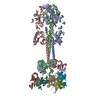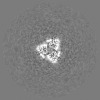[English] 日本語
 Yorodumi
Yorodumi- EMDB-26521: Post-fusion ectodomain of HSV-1 gB in complex with HSV010-13 Fab -
+ Open data
Open data
- Basic information
Basic information
| Entry |  | |||||||||
|---|---|---|---|---|---|---|---|---|---|---|
| Title | Post-fusion ectodomain of HSV-1 gB in complex with HSV010-13 Fab | |||||||||
 Map data Map data | gB in complex with HSV010-13 Fab | |||||||||
 Sample Sample |
| |||||||||
 Keywords Keywords | glycoprotein / fusogen / antibody / ADCC / VIRAL PROTEIN / VIRAL PROTEIN-Immune System complex | |||||||||
| Function / homology |  Function and homology information Function and homology informationhost cell Golgi membrane / host cell endosome membrane / viral envelope / symbiont entry into host cell / virion attachment to host cell / host cell plasma membrane / virion membrane / identical protein binding / membrane Similarity search - Function | |||||||||
| Biological species |    Human alphaherpesvirus 1 strain KOS Human alphaherpesvirus 1 strain KOS | |||||||||
| Method | single particle reconstruction / cryo EM / Resolution: 3.4 Å | |||||||||
 Authors Authors | Windsor IW / Kong SL / Garforth SJ / Almo SC / Harrison SC | |||||||||
| Funding support |  United States, 1 items United States, 1 items
| |||||||||
 Citation Citation |  Journal: J Clin Invest / Year: 2023 Journal: J Clin Invest / Year: 2023Title: A non-neutralizing glycoprotein B monoclonal antibody protects against herpes simplex virus disease in mice. Authors: Masayuki Kuraoka / Clare Burn Aschner / Ian W Windsor / Aakash Mahant Mahant / Scott J Garforth / Susan Luozheng Kong / Jacqueline M Achkar / Steven C Almo / Garnett Kelsoe / Betsy C Herold /  Abstract: There is an unmet need for monoclonal antibodies (mAbs) for prevention or as adjunctive treatment of herpes simplex virus (HSV) disease. Most vaccine and mAb efforts focus on neutralizing antibodies, ...There is an unmet need for monoclonal antibodies (mAbs) for prevention or as adjunctive treatment of herpes simplex virus (HSV) disease. Most vaccine and mAb efforts focus on neutralizing antibodies, but for HSV this strategy has proven ineffective. Preclinical studies with a candidate HSV vaccine strain, ΔgD-2, demonstrated that non-neutralizing antibodies that activate Fcγ receptors (FcγRs) to mediate antibody-dependent cellular cytotoxicity (ADCC) provide active and passive protection against HSV-1 and HSV-2. We hypothesized that this vaccine provides a tool to identify and characterize protective mAbs. We isolated HSV-specific mAbs from germinal center and memory B cells and bone marrow plasmacytes of ΔgD-2-vaccinated mice and evaluated these mAbs for binding, neutralizing, and FcγR-activating activity and for protective efficacy in mice. The most potent protective mAb, BMPC-23, was not neutralizing but activated murine FcγRIV, a biomarker of ADCC. The cryo-electron microscopic structure of the Fab-glycoprotein B (gB) assembly identified domain IV of gB as the epitope. A single dose of BMPC-23 administered 24 hours before or after viral challenge provided significant protection when configured as mouse IgG2c and protected mice expressing human FcγRIII when engineered as a human IgG1. These results highlight the importance of FcR-activating antibodies in protecting against HSV. | |||||||||
| History |
|
- Structure visualization
Structure visualization
| Supplemental images |
|---|
- Downloads & links
Downloads & links
-EMDB archive
| Map data |  emd_26521.map.gz emd_26521.map.gz | 165.3 MB |  EMDB map data format EMDB map data format | |
|---|---|---|---|---|
| Header (meta data) |  emd-26521-v30.xml emd-26521-v30.xml emd-26521.xml emd-26521.xml | 16.1 KB 16.1 KB | Display Display |  EMDB header EMDB header |
| Images |  emd_26521.png emd_26521.png | 61.8 KB | ||
| Filedesc metadata |  emd-26521.cif.gz emd-26521.cif.gz | 5.7 KB | ||
| Others |  emd_26521_half_map_1.map.gz emd_26521_half_map_1.map.gz emd_26521_half_map_2.map.gz emd_26521_half_map_2.map.gz | 140.6 MB 140.7 MB | ||
| Archive directory |  http://ftp.pdbj.org/pub/emdb/structures/EMD-26521 http://ftp.pdbj.org/pub/emdb/structures/EMD-26521 ftp://ftp.pdbj.org/pub/emdb/structures/EMD-26521 ftp://ftp.pdbj.org/pub/emdb/structures/EMD-26521 | HTTPS FTP |
-Validation report
| Summary document |  emd_26521_validation.pdf.gz emd_26521_validation.pdf.gz | 872.4 KB | Display |  EMDB validaton report EMDB validaton report |
|---|---|---|---|---|
| Full document |  emd_26521_full_validation.pdf.gz emd_26521_full_validation.pdf.gz | 872 KB | Display | |
| Data in XML |  emd_26521_validation.xml.gz emd_26521_validation.xml.gz | 14.8 KB | Display | |
| Data in CIF |  emd_26521_validation.cif.gz emd_26521_validation.cif.gz | 17.6 KB | Display | |
| Arichive directory |  https://ftp.pdbj.org/pub/emdb/validation_reports/EMD-26521 https://ftp.pdbj.org/pub/emdb/validation_reports/EMD-26521 ftp://ftp.pdbj.org/pub/emdb/validation_reports/EMD-26521 ftp://ftp.pdbj.org/pub/emdb/validation_reports/EMD-26521 | HTTPS FTP |
-Related structure data
| Related structure data |  7ui0MC  7uhzC M: atomic model generated by this map C: citing same article ( |
|---|---|
| Similar structure data | Similarity search - Function & homology  F&H Search F&H Search |
- Links
Links
| EMDB pages |  EMDB (EBI/PDBe) / EMDB (EBI/PDBe) /  EMDataResource EMDataResource |
|---|
- Map
Map
| File |  Download / File: emd_26521.map.gz / Format: CCP4 / Size: 178 MB / Type: IMAGE STORED AS FLOATING POINT NUMBER (4 BYTES) Download / File: emd_26521.map.gz / Format: CCP4 / Size: 178 MB / Type: IMAGE STORED AS FLOATING POINT NUMBER (4 BYTES) | ||||||||||||||||||||||||||||||||||||
|---|---|---|---|---|---|---|---|---|---|---|---|---|---|---|---|---|---|---|---|---|---|---|---|---|---|---|---|---|---|---|---|---|---|---|---|---|---|
| Annotation | gB in complex with HSV010-13 Fab | ||||||||||||||||||||||||||||||||||||
| Projections & slices | Image control
Images are generated by Spider. | ||||||||||||||||||||||||||||||||||||
| Voxel size | X=Y=Z: 0.825 Å | ||||||||||||||||||||||||||||||||||||
| Density |
| ||||||||||||||||||||||||||||||||||||
| Symmetry | Space group: 1 | ||||||||||||||||||||||||||||||||||||
| Details | EMDB XML:
|
-Supplemental data
-Half map: half map 2
| File | emd_26521_half_map_1.map | ||||||||||||
|---|---|---|---|---|---|---|---|---|---|---|---|---|---|
| Annotation | half map 2 | ||||||||||||
| Projections & Slices |
| ||||||||||||
| Density Histograms |
-Half map: half map 1
| File | emd_26521_half_map_2.map | ||||||||||||
|---|---|---|---|---|---|---|---|---|---|---|---|---|---|
| Annotation | half map 1 | ||||||||||||
| Projections & Slices |
| ||||||||||||
| Density Histograms |
- Sample components
Sample components
-Entire : Trimeric, post-fusion HSV-1 gB in complex with three HSV010-13 Fabs
| Entire | Name: Trimeric, post-fusion HSV-1 gB in complex with three HSV010-13 Fabs |
|---|---|
| Components |
|
-Supramolecule #1: Trimeric, post-fusion HSV-1 gB in complex with three HSV010-13 Fabs
| Supramolecule | Name: Trimeric, post-fusion HSV-1 gB in complex with three HSV010-13 Fabs type: complex / ID: 1 / Parent: 0 / Macromolecule list: all |
|---|---|
| Source (natural) | Organism:  |
-Macromolecule #1: Envelope glycoprotein B
| Macromolecule | Name: Envelope glycoprotein B / type: protein_or_peptide / ID: 1 / Number of copies: 3 / Enantiomer: LEVO |
|---|---|
| Source (natural) | Organism:   Human alphaherpesvirus 1 strain KOS / Strain: KOS Human alphaherpesvirus 1 strain KOS / Strain: KOS |
| Molecular weight | Theoretical: 71.668188 KDa |
| Recombinant expression | Organism:  Trichoplusia ni (cabbage looper) Trichoplusia ni (cabbage looper) |
| Sequence | String: DIKAENTDAN FYVCPPPTGA TVVQFEQPRR CPTRPEGQNY TEGIAVVFKE NIAPYKFKAT MYYKDVTVSQ VWFGHRYSQF MGIFEDRAP VPFEEVIDKI NAKGVCRSTA KYVRNNLETT AFHRDDHETD MELKPANAAT RTSRGWHTTD LKYNPSRVEA F HRYGTTVN ...String: DIKAENTDAN FYVCPPPTGA TVVQFEQPRR CPTRPEGQNY TEGIAVVFKE NIAPYKFKAT MYYKDVTVSQ VWFGHRYSQF MGIFEDRAP VPFEEVIDKI NAKGVCRSTA KYVRNNLETT AFHRDDHETD MELKPANAAT RTSRGWHTTD LKYNPSRVEA F HRYGTTVN CIVEEVDARS VYPYDEFVLA TGDFVYMSPF YGYREGSHTE HTTYAADRFK QVDGFYARDL TTKARATAPT TR NLLTTPK FTVAWDWVPK RPSVCTMTKW QEVDEMLRSE YGGSFRFSSD AISTTFTTNL TEYPLSRVDL GDCIGKDARD AMD RIFARR YNATHIKVGQ PQYYQANGGF LIAYQPLLSN TLAELYVREH LREQSRKPPN PTPPPPGASA NASVERIKTT SSIE FARLQ FTYNHIQRHV NDMLGRVAIA WCELQNHELT LWNEARKLNP NAIASVTVGR RVSARMLGDV MAVSTCVPVA ADNVI VQNS MRISSRPGAC YSRPLVSFRY EDQGPLVEGQ LGENNELRLT RDAIEPCTVG HRRYFTFGGG YVYFEEYAYS HQLSRA DIT TVSTFIDLNI TMLEDHEFVP LEVYTRHEIK DSGLLDYTEV QRRNQLHDLR FADIDTVIHA DANAA UniProtKB: Envelope glycoprotein B |
-Macromolecule #2: HSV10-13 Fab Heavy chain
| Macromolecule | Name: HSV10-13 Fab Heavy chain / type: protein_or_peptide / ID: 2 / Number of copies: 3 / Enantiomer: LEVO |
|---|---|
| Source (natural) | Organism:  |
| Molecular weight | Theoretical: 13.043623 KDa |
| Recombinant expression | Organism:  Homo sapiens (human) Homo sapiens (human) |
| Sequence | String: QVQLQQPGAE LVKPGASVKL SCKASGYTFT SYWIHWVKQG PGQGLEWIGM IHPNSGITHY NEKFKTKATL TVDKSSSTAY MQLSSLTSE DSAVCYCARG SSSGSAWFAY WGQGTLVTVS AA |
-Macromolecule #3: HSV10-13 Light chain
| Macromolecule | Name: HSV10-13 Light chain / type: protein_or_peptide / ID: 3 / Number of copies: 3 / Enantiomer: LEVO |
|---|---|
| Source (natural) | Organism:  |
| Molecular weight | Theoretical: 11.886177 KDa |
| Recombinant expression | Organism:  Homo sapiens (human) Homo sapiens (human) |
| Sequence | String: DIQMTQSSSY LSESLGGRVT ITCKASDHIN NWLAWYQQKP GNAPRLLISG ATSLETGVPS RFSGSGSGKD YTLSITSLQT EDVATYYCQ QYWSSPLTFG AGTKLELKRA |
-Experimental details
-Structure determination
| Method | cryo EM |
|---|---|
 Processing Processing | single particle reconstruction |
| Aggregation state | particle |
- Sample preparation
Sample preparation
| Buffer | pH: 7.5 |
|---|---|
| Vitrification | Cryogen name: ETHANE |
- Electron microscopy
Electron microscopy
| Microscope | FEI TITAN KRIOS |
|---|---|
| Image recording | Film or detector model: GATAN K3 BIOQUANTUM (6k x 4k) / Average electron dose: 55.3 e/Å2 |
| Electron beam | Acceleration voltage: 300 kV / Electron source:  FIELD EMISSION GUN FIELD EMISSION GUN |
| Electron optics | Illumination mode: FLOOD BEAM / Imaging mode: BRIGHT FIELD / Nominal defocus max: 1.8 µm / Nominal defocus min: 0.6 µm |
| Experimental equipment |  Model: Titan Krios / Image courtesy: FEI Company |
- Image processing
Image processing
| Startup model | Type of model: OTHER |
|---|---|
| Final reconstruction | Resolution.type: BY AUTHOR / Resolution: 3.4 Å / Resolution method: FSC 0.143 CUT-OFF / Number images used: 123068 |
| Initial angle assignment | Type: MAXIMUM LIKELIHOOD |
| Final angle assignment | Type: MAXIMUM LIKELIHOOD |
 Movie
Movie Controller
Controller




 Z (Sec.)
Z (Sec.) Y (Row.)
Y (Row.) X (Col.)
X (Col.)




































